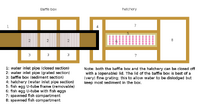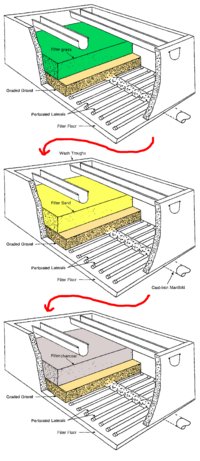(article cleanup) |
|||
| (6 intermediate revisions by 2 users not shown) | |||
| Line 1: | Line 1: | ||
This article deals around the set-up of a (extremely) low cost water filtration system. Water filtration can be used if there are few or no other options of obtaining (pure) water from other sources: ie rainwater, groundwater (rather than surface water), ... If no filtering needs to be done at all on water, it is generally cheaper, and it also avoids the use of energy (and possible air pollution). Things will depend on the local context (water source availability) however. | {{status-design}} | ||
This article deals around the set-up of a (extremely) low cost [[water filtration]] system. Water filtration can be used if there are few or no other options of obtaining (pure) water from other sources: ie rainwater, groundwater (rather than surface water), ... If no filtering needs to be done at all on water, it is generally cheaper, and it also avoids the use of energy (and possible air pollution). Things will depend on the local context (water source availability) however. | |||
==Purpose== | ==Purpose== | ||
[[File:Small_scale_fish_hatchery.PNG|thumb|right|200px|A baffle for (pre-)treating the water supply to fish]] | [[File:Small_scale_fish_hatchery.PNG|thumb|right|200px|A baffle for (pre-)treating the water supply to fish]] | ||
[[File: | [[File:3_stage_communal_water_filter.png|thumb|right|200px|A communal water filter]] | ||
The purpose of setting up the explained low-cost sytem of the water filtration is to make water clean of debris/particles | The purpose of setting up the explained low-cost sytem of the water filtration is to make water clean of debris/particles as well as the worst filth. If the water is intented to be drunk, [[Heating water|HEAT the water to a boil]] (100°C) for 5 minutes (7 minutes when at a high altitude)<ref>[http://www.all-things-emergency-prepared.com/ways-to-purify-water.html Boiling water]</ref> is desirable, and is often recommended for [[public health]] reasons - but heating above 70 def C{{fact}} will kill the majority of pathogens, especially if held at that temperature for a period. Otherwise, you can use the water as is (e.g. for [[aquaculture]], ...) or [[Solar Still|distill it]]. | ||
==Set up== | ==Set up== | ||
Regarding the components of the filter: | Regarding the components of the filter: it consists of grass, sand and charcoal. The first element (grass) filters out any large debris/particles. The sand also acts as a filter/sieve, pretty much in the same way as the grass. Note that I'm guessing that the grass was taken as a primary filter since this is easier to come by/cheaper than sand and thus can be replaced more often. The charcoal finally is a third filter and is the most efficient filter, it can filter out the smallest of particles, including ''some'' organic organisms (ie bacteria, ...); however still by no means all (boil the water for this). | ||
it consists of grass, sand and charcoal. The first element (grass) filters out any large debris/particles. The sand also acts as a filter/sieve, pretty much in the same way as the grass. Note that I'm guessing that the grass was taken as a primary filter since this is easier to come by/cheaper than sand and thus can be replaced more often. The charcoal finally is a third filter and is the most efficient filter, it can filter out the smallest of particles, including organic organisms (ie bacteria, ...) | |||
The DIY filter water filter is intended as a setup used in extreme [[emergency]] situations; it could be used in a rural context, ie especially in very poor areas, without much access to any building materials. However, a system set up especially for general use may be better in a domestic context: such a system may be more sustainable and easy to maintain. If some additional treatments are added, the water can also be made even more pure. | |||
To make the water purer, see [[Treatment_pond]] and http://en.wikipedia.org/wiki/Rainwater_harvesting (the latter is about rainwater harvesting, but it contains some systems/information on the general set-up of domestic water filtering as well) | |||
==See also== | ==See also== | ||
| Line 20: | Line 19: | ||
==References== | ==References== | ||
* http://en.wikipedia.org/wiki/Appropriate_technology#Water_supply_and_treatment | * http://en.wikipedia.org/wiki/Appropriate_technology#Water_supply_and_treatment | ||
* http://en.wikipedia.org/wiki/Carbon_filtering | |||
* http://en.wikipedia.org/wiki/Sand_filter | |||
{{reflist}} | {{reflist}} | ||
[[Category: Water treatment]] | [[Category: Water treatment]] | ||
[[Category: Water filters]] | [[Category: Water filters]] | ||
Revision as of 10:22, 16 July 2013
Template:Status-design This article deals around the set-up of a (extremely) low cost water filtration system. Water filtration can be used if there are few or no other options of obtaining (pure) water from other sources: ie rainwater, groundwater (rather than surface water), ... If no filtering needs to be done at all on water, it is generally cheaper, and it also avoids the use of energy (and possible air pollution). Things will depend on the local context (water source availability) however.
Purpose


The purpose of setting up the explained low-cost sytem of the water filtration is to make water clean of debris/particles as well as the worst filth. If the water is intented to be drunk, HEAT the water to a boil (100°C) for 5 minutes (7 minutes when at a high altitude)[1] is desirable, and is often recommended for public health reasons - but heating above 70 def C[verification needed] will kill the majority of pathogens, especially if held at that temperature for a period. Otherwise, you can use the water as is (e.g. for aquaculture, ...) or distill it.
Set up
Regarding the components of the filter: it consists of grass, sand and charcoal. The first element (grass) filters out any large debris/particles. The sand also acts as a filter/sieve, pretty much in the same way as the grass. Note that I'm guessing that the grass was taken as a primary filter since this is easier to come by/cheaper than sand and thus can be replaced more often. The charcoal finally is a third filter and is the most efficient filter, it can filter out the smallest of particles, including some organic organisms (ie bacteria, ...); however still by no means all (boil the water for this).
The DIY filter water filter is intended as a setup used in extreme emergency situations; it could be used in a rural context, ie especially in very poor areas, without much access to any building materials. However, a system set up especially for general use may be better in a domestic context: such a system may be more sustainable and easy to maintain. If some additional treatments are added, the water can also be made even more pure.
To make the water purer, see Treatment_pond and http://en.wikipedia.org/wiki/Rainwater_harvesting (the latter is about rainwater harvesting, but it contains some systems/information on the general set-up of domestic water filtering as well)